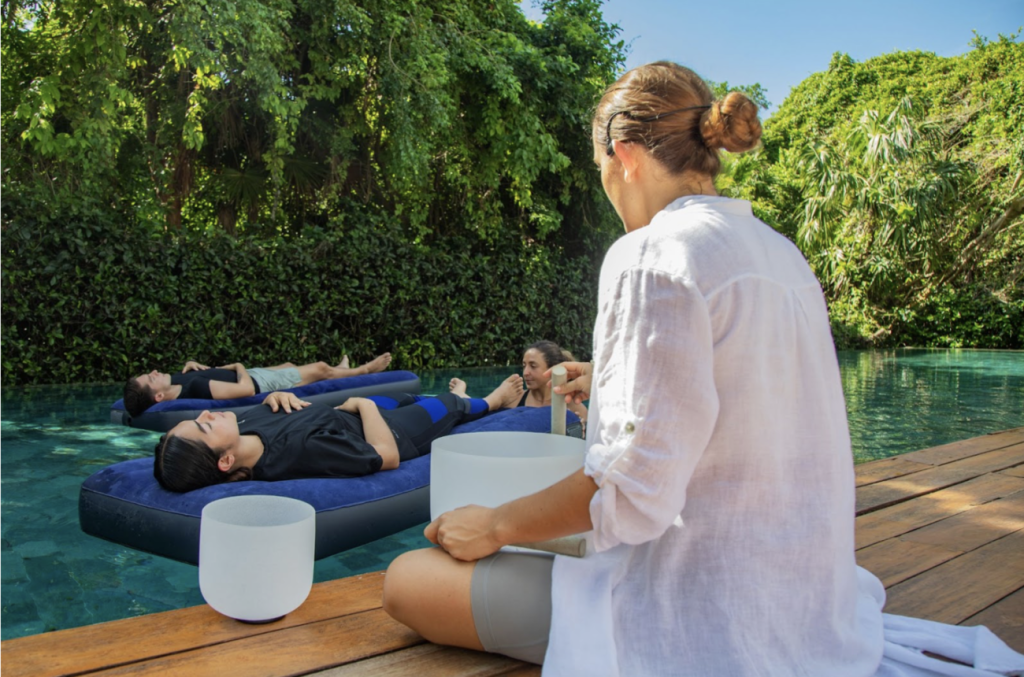Sounds of Water: How Auditory Meditation During Bathing Can Calm the Mind and Reduce Stress

Discovering the Calming Symphony of Water
Imagine enveloping yourself in the warm embrace of a soothing bath, a soft glow illuminating the space around you. As you settle in, the comforting sounds of water begin to fill your senses—perhaps the gentle trickle of a stream or the rhythmic drumming of rain tapping against the roof. This harmonious backdrop can do more than simply create a beautiful atmosphere; it can facilitate a profound sense of mental clarity and emotional peace.
In an environment where stress often looms as a relentless adversary, incorporating the sounds of water into your daily routine can be transformative. Especially when paired with the practice of auditory meditation, these peaceful sounds embody nature’s ability to soothe the soul. Listening to water can act as an anchor, enhancing your ability to find calm amidst chaos. Here are several significant benefits that underscore this practice:
- Reduces Anxiety: The repetitive, rhythmic qualities of water create a sense of safety and nurturing, effectively lowering levels of anxiety. Research suggests that exposure to natural sounds reduces cortisol levels and promotes a state of relaxation.
- Enhances Focus: In a world filled with noise and distraction, the sounds of water can serve as a form of white noise, allowing your mind to center and engage in deeper meditation. For instance, the gentle hum of a shower can drown out external disturbances, providing a sanctuary for contemplation.
- Promotes Relaxation: The combination of warm water and serene sounds stimulates the body’s relaxation response, releasing tension from both the mind and muscles. This interaction can replenish your energy and improve your mood significantly.
A particularly fascinating aspect of this practice is its connection to the rich tapestry of Nigerian culture. Traditional beliefs underline the significance of water as a purifying element, both physically and spiritually. Many Nigerians find solace in the rhythmic melodies associated with rain, whether it’s the pitter-patter on a tin roof or the serene sounds of rivers in serene landscapes. Engaging with these auditory experiences fosters a deep spiritual connection while cultivating a tranquil state of mind.
As we delve deeper into the profound effects of the sounds of water, you’ll uncover various ways to weave this practice into your life. From creating a peaceful bathing environment with the help of sound machines or apps that play nature sounds, to finding moments during your day to listen to a nearby river or fountain, the potential for tranquility is vast. Join us on this enlightening journey as we explore how the soothing sounds of water can pave the way to achieving a peaceful mind and a stress-free existence.
ADDITIONAL INSIGHTS: Expand your understanding here

The Therapeutic Power of Water Sounds
The relationship between sound and human well-being has been studied extensively, with natural sounds like water revealing particularly profound effects on the mind and body. As you immerse yourself in the tranquil embrace of a bath, the sounds that surround you have the ability to influence your emotional landscape significantly. The cascading notes of a waterfall or the soft rhythm of waves lapping at a shore create an auditory tapestry that invites relaxation and deep reflection. This phenomenon connects deeply with our innate instincts—water has always been viewed as a symbol of life and renewal, especially in cultures that thrive around bodies of water.
Research indicates that immersing oneself in the sounds of water can lead to a reduction in stress levels. When the mind is exposed to what is known as biophonic sounds, the brain responds positively, fostering feelings of safety and grounding. Listening to the melodies of nature significantly enhances a person’s ability to relax, which can be especially beneficial in the fast-paced environments many Nigerians find themselves navigating. Recent studies have shown that the soft sounds of rain can even synchronize with our brainwaves, promoting a state similar to meditation, where calmness prevails over anxiety.
Understanding these dynamics, it is essential to explore how one can incorporate the soothing sounds of water into their everyday life. Here are some ways to enhance your auditory meditation experience while bathing:
- Use Sound Devices: Sound machines or apps possess an array of nature sounds, including those of flowing rivers or gentle rain. Turning on these sounds while soaking in the bath can immediately furnish your space with the soothing atmosphere you need.
- Create a Natural Sound Environment: If you have access to a natural water source, whether it be a nearby stream or a fountain, consider taking a moment to listen to these sounds regularly. Integrating this practice can break the monotony of daily life while endowing you with moments of serenity.
- Mindful Listening: During your bath, focus on the different layers of sound. As you listen, try identifying the specific pitches and rhythms that engage your attention. This mindfulness shift can enhance your meditative practice and lead to deeper relaxation.
Water’s essence as a purifying agent resonates deeply within the Nigerian cultural context. For instance, communities often celebrate rainfall not just for its practical benefits but for the peace and rejuvenation it brings to the spirit. The echoing sounds of water during the rainy season remind many of the gentle rhythms of life—of renewal, growth, and hope. This cultural appreciation for water can guide your auditory meditation practice, steeped in traditions that respect and honor the element.
With the understanding that the sounds of water can serve as a powerful tool for mental clarity and emotional well-being, it becomes evident that embracing these elements within our daily routines may ultimately pave the way to tranquility and stress reduction. As we further explore the integration of these calming sounds, we will unveil more practices and insights that can nurture a profound sense of peace in our increasingly hectic lives.
| Category | Key Benefits |
|---|---|
| Enhanced Relaxation | Bathing with the sounds of water promotes a state of tranquility, reducing cortisol levels and enhancing overall well-being. |
| Mindfulness Practice | Incorporating auditory elements during bathing encourages mindfulness, helping individuals focus on the present moment and diminish racing thoughts. |
The soothing tones of flowing water can serve as a natural remedy for stress relief. By incorporating auditory meditation during your bathing routine, individuals may find themselves in a serene mental space that fosters relaxation. Research indicates that sounds like water trickling can lower anxiety levels significantly, which is crucial in today’s fast-paced environment.Moreover, the practice of mindful bathing involves engaging the senses fully—focusing on the sound of water, the warmth of the bath, and the sensation of the water on your skin. This engagement not only aids in calming the mind but also enhances emotional stability. Engaging in this holistic practice can lead those seeking peace and balance to discover profound benefits that ripple through their daily lives. As scientific studies suggest, auditory stimuli can evoke an emotionally richer experience, further promoting effective stress management. Understanding how meditative soundscapes contribute to mental clarity and emotional resilience can encourage more individuals to embrace this beneficial ritual. By experimenting with different sounds and water environments, relaxation can become not just a momentary escape, but a powerful tool for a healthier life.
SEE ALSO: Click here to read another article
Integrating Water Sounds into Daily Life
To truly harness the calming effects of water sounds, integrating them into your daily life expands beyond just bath time. Creating an environment that promotes auditory meditation can help cultivate a consistent practice that alleviates stress throughout your day. Drawing inspiration from cultural traditions and modern techniques can enrich this experience.
In Nigeria, where the ebb and flow of natural water sources are integral to everyday life, listening to water sounds can lead to moments of introspection. In urban settings such as Lagos or Abuja, individuals may find it challenging to tap into these natural sounds due to the hustle and bustle of city life. However, finding inner peace through auditory meditation is not confined to tranquil surroundings; it can be cultivated anywhere with intention.
Creating the Perfect Atmosphere
Incorporating water sounds into your home environment requires some thoughtful planning:
- Calming Water Features: Consider introducing small fountains or aquariums in your living space. The soft bubbling of water can create a soothing backdrop that transforms your home into a sanctuary.
- Soundscapes in Your Routine: Play recordings of flowing water or rain sounds during daily activities. Whether you’re cooking, working, or performing household chores, these sounds can create a calming ambiance, making even mundane tasks feel more serene.
- Guided Meditations: Many meditation apps offer guided sessions that incorporate water sounds specifically designed for stress relief. These sessions can help enhance your mindfulness practice, concentrating on deep breathing coupled with the soothing sound of water.
The impact of such intentional soundscapes makes a case for fostering a deeper connection with water. The propensity for water sounds to enhance one’s mood isn’t merely anecdotal; studies show that this environmental factor can significantly decrease blood pressure and heart rates, leading to prolonged feelings of relaxation. In this way, auditory meditation serves as both a preventive and healing practice.
Bridging Tradition and Modern Techniques
When examining how traditional practices can meld with contemporary mindfulness, the ritual of bathing in Nigeria emerges as significant. The time-honored practice of family gatherings around water bodies during festivals showcases the unique connection between communal and solitary experiences with water. Recent research has indicated that shared activities involving sound, such as singing or storytelling by riverside gatherings, contribute to lower stress levels through fostering community connection.
Furthermore, the use of traditional herbal infusions can be an excellent complement to the auditory experience. Utilizing roots and herbs familiar in Nigerian culture—such as ginger or bitter leaf—while soaking can enhance both the aromatic and auditory elements of your bath, amplifying relaxation. This dual practice encourages a comprehensive approach to well-being, blending sound, scent, and tactile experiences.
The call to embrace the sounds of water during auditory meditation is an opportunity for connection, not just to oneself, but also to the environment and cultural heritage. By systematically incorporating audio and sensory experiences, individuals can create a healing ritual that alleviates stress and promotes a profound sense of peace.
RECOMMENDED: Check out this similar article
Conclusion
In a world increasingly dominated by noise and chaos, the sounds of water offer a comforting balm for the weary mind. Our exploration of auditory meditation during bathing illustrates how the subtle and soothing sounds—whether cascading waterfalls, gentle rain, or ocean waves—serve not only to calm the senses but also to significantly reduce stress levels. The intentional integration of these sounds into daily life, whether through natural water features, sound recordings, or guided meditations, can transform ordinary routines into serene rituals that promote mental well-being.
Moreover, by bridging traditional practices with contemporary mindfulness techniques, individuals can foster meaningful connections between themselves and their cultural heritage. In Nigeria, the communal experiences around water reflect a long-standing appreciation for its healing and reflective qualities. As we consider the scientific backing that underscores the physiological benefits of water sounds—such as decreased heart rates and lowered blood pressure—it becomes evident that engaging with these auditory elements is not merely a luxury, but a necessary pathway to enhanced mental health.
Ultimately, embracing the sounds of water allows us to reconnect with our environment, providing a unique opportunity for introspection and tranquility amidst a fast-paced lifestyle. As we cultivate a regular practice of auditory meditation, we open ourselves to a deeper sense of peace and resiliency—an invaluable gift for navigating the challenges of modern life. Encouraging this exploration is an invitation for readers to discover the transformative power of water sounds, promising a journey of relaxation and self-discovery that transcends the confines of our busy lives.



